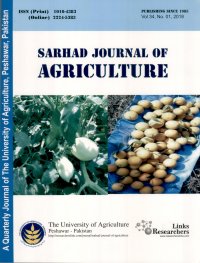Analysis of Agricultural Land Price Determinants and Policy Implications for Controlling Residential and Commercial Encroachments: Facts from District Swabi (Pakistan)
Muhammad Abdullah1, Syed Attaullah Shah1, Khurram Nawaz Saddozai1, Jahangir Khan1*, Mohammad Fayaz1, Irfan Ullah1* and Sabeeh Ullah2
ABSTRACT
This study was conducted to examine the characteristics of agricultural land parcels and identify important determinants of their prices in Swabi district of Khyber Pakhtunkhwa. For this purpose, a sample of 79 land parcels, having transaction record for the year 2015-2017, was selected from 10 randomly chosen villages. Data were collected on their prices and their physical, agricultural and location characteristics. Descriptive statistical tools were used to summarize data on agricultural land characteristics. A linear Hedonic Pricing Model (HPM) was used to estimate agricultural land prices based on physical, location and agricultural characteristics. Results show that agricultural land parcels in Central Swabi district have comparatively high prices, and this is due to their high residential and commercial potential. Developmental projects for roads, hospitals, universities and gas supply infrastructure in the surroundings of Swabi city are resulting human influx from rural areas, and are increasing demand for residential and commercial units in the suburbs. This high demand is pulling land prices and causing utilization of fertile agricultural land for residential and commercial units’ construction. Around 50% of the sampled agricultural lands were used for residential and commercial purposes. Results from HPM reveal that agricultural characteristics, such as land fertility and irrigation water availability, were the significant determinates and have positive effects on land prices. Location characteristics, such as road distance, city distance, distance to nearby houses and distance to agricultural market are the important determinants of land prices. These findings imply that agricultural land prices depends on agricultural and location attributes and this is consistent with the Ricardian’s Land ‘Rent’ and Von Thunan’s ‘Land Location’ theories. Based on these findings, the study recommends that agricultural land must be protected through laws from residential and commercial encroachments. Investment in development of agricultural infrastructure and provision of subsidized on important inputs could raise farmers’ returns from agriculture and could change their perception to favor using land for agriculture.
To share on other social networks, click on any share button. What are these?







